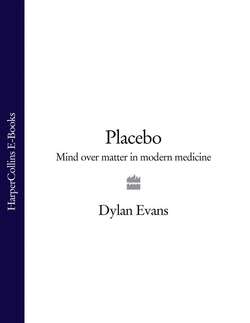Читать книгу Placebo: Mind over Matter in Modern Medicine - Dylan Evans - Страница 20
KINDS OF PAIN
ОглавлениеTo say that placebos can relieve pain is to make a very general claim. For the species of pain are as abundant as the flora and fauna in a tropical rainforest. Pain can be flickering, quivering, beating or pounding. It can be sharp and cutting or dull and throbbing. It can be caused by material objects such as stinging nettles and bullets, or by tension and worry. There are mild pains, annoying pains, and excruciating pains. And pain can strike anywhere in the body; there are headaches, stomachaches, swollen ankles, and backaches. It would be impressive indeed if placebos could affect all these different beasts.
Without doing separate tests for each different kind of pain, we cannot be absolutely sure that placebos can relieve them all. However, nobody has yet identified a kind of pain that is completely unresponsive to placebos, which does suggest that they work across the board. The pain of a headache is typically very different to that experienced in the aftermath of a dental operation or chest surgery, yet headaches too are placebo-responsive. In one experiment, two British psychologists recruited over eight hundred female volunteers to take part in a study of headache pills.9 They gave the volunteers, at random, identical packets of pills, and told them to take two tablets for any headache they had during the following two weeks – and to note down how much relief they obtained. Half the tablets were placebos.
This study did not include a no-treatment group, but it got round this problem in an ingenious way, by making half the packets identical in every way to those of a well-known painkiller, while the remaining packets were simply labelled ‘analgesic tablets’. This applied to both the placebo packets and the packets containing the active tablets, which were of the same well-known brand. There were, therefore, four groups in the study: two placebo groups (one of which was issued with the placebo tablets in a branded packet) and two nonplacebo groups (with the same division into branded and unbranded packets).
By comparing the pain relief from all four groups, the experimenters were able to calculate the effects of branding itself on the treatment of headaches. The result was clear: within each group (placebo and nonplacebo), those taking branded tablets got more relief than those taking unbranded pills – though the branding effect was not as powerful as the effect of the active ingredient. Since branding must clearly act via a psychological route, this study supports the idea that headaches are no exception to the general rule that placebos can affect all sorts of pain.
